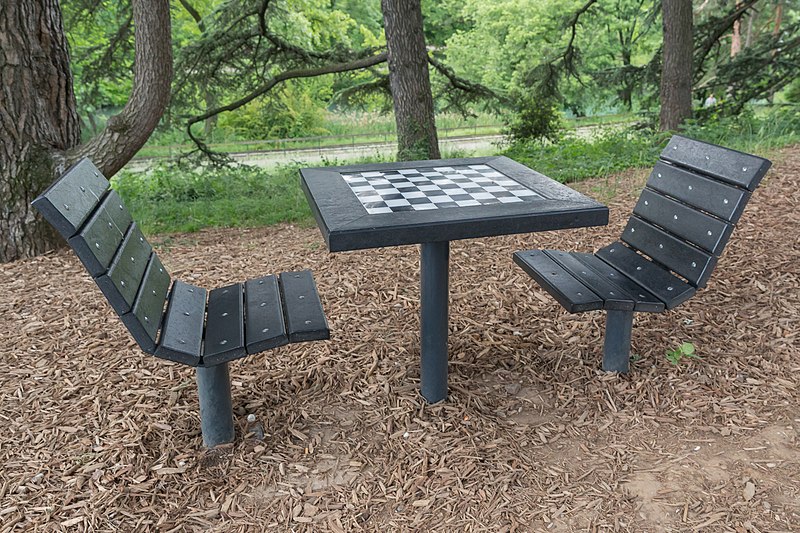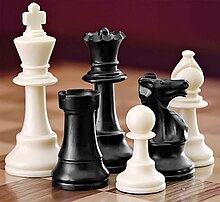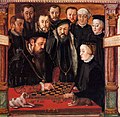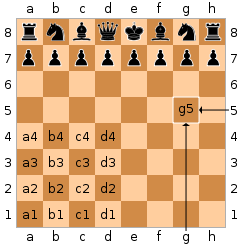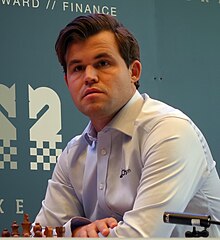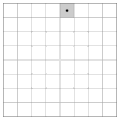Our website is made possible by displaying online advertisements to our visitors.
Please consider supporting us by disabling your ad blocker.
Portal:Chess
Introduction
Chess is a board game for two players. It is sometimes called international chess or Western chess to distinguish it from related games such as xiangqi (Chinese chess) and shogi (Japanese chess).
Chess is an abstract strategy game which involves no hidden information and no elements of chance. It is played on a square game board called a chessboard containing 64 squares arranged in an 8×8 grid. The players, referred to as "White" and "Black", each control sixteen pieces: one king, one queen, two rooks, two bishops, two knights, and eight pawns. White moves first, followed by Black; then moves alternate. The object of the game is to checkmate (threaten with inescapable capture) the enemy king. There are also several ways a game can end in a draw.
The recorded history of chess goes back at least to the emergence of a similar game, chaturanga, in seventh-century India. After its introduction in Persia, it spread to the Arab world and then to Europe. The modern rules of chess emerged in Europe at the end of the 15th century, with standardization and universal acceptance by the end of the 19th century. Today, chess is one of the world's most popular games, with millions of players worldwide. (Full article...)
Selected article -
Stalemate is a situation in chess where the player whose turn it is to move is not in check and has no legal move. Stalemate results in a draw. During the endgame, stalemate is a resource that can enable the player with the inferior position to draw the game rather than lose. In more complex positions, stalemate is much rarer, usually taking the form of a swindle that succeeds only if the superior side is inattentive. Stalemate is also a common theme in endgame studies and other chess problems.
The outcome of a stalemate was standardized as a draw in the 19th century (). Before this standardization, its treatment varied widely, including being deemed a win for the stalemating player, a half-win for that player, or a loss for that player; not being permitted; and resulting in the stalemated player missing a turn. Stalemate rules vary in variants and other games of the chess family.
(Full article...)General images
Selected image
FIDE world ranking
| Rank | Player | Rating |
|---|---|---|
| 1 | 2831 | |
| 2 | 2803 | |
| 3 | 2802 | |
| 4 | 2801 | |
| 5 | 2777 | |
| 6 | 2768 | |
| 7 | 2763 | |
| 8 | 2754 | |
| 9 | 2751 | |
| 10 | 2750 | |
| 11 | 2747 | |
| 12 | 2747 | |
| 13 | 2741 | |
| 14 | 2741 | |
| 15 | 2740 | |
| 16 | 2739 | |
| 17 | 2734 | |
| 18 | 2734 | |
| 19 | 2733 | |
| 20 | 2733 |
Top 10 WikiProject Chess Popular articles of the month
Did you know...
- ... that Magnus Carlsen, the current World Chess Champion, resigned a recent tournament game after only one move?
Reviewed articles
Chess from A to Z
| Index: | A B C D E F G H I J K L M N O P Q R S T U V W X Y Z (0–9) |
| Glossary: | A B C D E F G H I J K L M N O P Q R S T U V W X Y Z |
Topics
Subcategories
Related portals
Related WikiProjects
Associated Wikimedia
The following Wikimedia Foundation sister projects provide more on this subject:
-
Commons
Free media repository -
Wikibooks
Free textbooks and manuals -
Wikidata
Free knowledge base -
Wikinews
Free-content news -
Wikiquote
Collection of quotations -
Wikisource
Free-content library -
Wikiversity
Free learning tools -
Wiktionary
Dictionary and thesaurus
Sources
Previous Page Next Page

